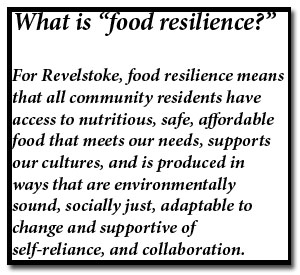By David F. Rooney
The committee drafting a Food Resilience Charter for Revelstoke has just received a $10,000 grant from the Real estate Foundation of BC to finance their work.
“I just received word this afternoon that we have been awarded $10,000 by the real Estate Foundation to proceed with this initiative,” Community Economic Development Director Alan Mason said in an e-mail to committee members on Wednesday, November 27. “These funds will be matched by $5,000 from CBT and $5,000 from the city.”
That’s a lot of money and the committee, which has gotten as far as writing a draft charter, will have to morph into a steering committee in order to manage the rest of the project.
During a committee meeting earlier this autumn Alan had mentioned that the Real Estate Foundation of BC had funding available for communities to put together food security strategies.
“I asked those attending one of the Charter meetings if they thought this was a good idea for Revelstoke and if people would be prepared to sit on a Steering Committee to direct this project if our funding application was successful,” he said.
He said he needs to know how many people will serve on a steering committee to carry this project forward.
“Just to be clear what will be involved, the funds for this project will be used to hire a consultant who will put together the Strategy for the community,” he said. “The role of the Steering Committee will be to provide direction to the consultant.
“The end date for the project is June 30, 2014. I would anticipate that we would have a total of 6-8 meetings before the end of June.”
Here is the draft Food Resiliency Charter as it stands now:
Revelstoke Community Food Resilience Charter
From our region’s earliest days First Nations and settlers have fished, hunted and gathered wild food and medicines. Farming and ranching began in the late 1800s and early 1900s as city dwellers maintained backyard gardens. In the 1970s, the reservoir behind the dam at Castlegar drowned the valley bottom increasing our reliance on food sources outside our immediate area.
Today, some of our community’s children and working families do not have reliable access to safe and nutritious food, with an  increasing number relying on the food bank.
increasing number relying on the food bank.
Much of the food we eat today is transported over long distances from where it is grown and processed. This dependence on imported food increases our impact on the environment and our vulnerability to food shortages from natural disasters or economic-setbacks. A growing number of households are responding by returning to the traditions of home gardening, wild food gathering and food preservation.
Revelstoke’s Integrated Community Sustainability Framework commits us to, among other things, achieving climate resilience and a healthy ecosystem, minimal waste, responsible water use, and carbon neutrality. It also urges us to ensure we have a healthy, active population, and a locally diverse economy.
Revelstoke’s Food Resilience Charter presents a vision to benefit our community and provides guidance for actions to achieve this vision. It is based on the belief that a thriving local food culture that celebrates producing locally and eating together will support us in living healthier, happier and richer lives – connected to the land, the growers and each other.
Vision
Recognizing that Revelstoke is culturally diverse, we are committed to strengthening our food resilience to support the economic, ecological and social well-being of the community with:
- Access to nutritious, safe, affordable food as a basic human right for all residents
- Access to food that is sustainably and ethically produced
- Recognizing of the importance of quality food to our health and well-being
- Increasing local and regional food production through personal, business and government actions
- Appreciating the importance of eating together
To create a just and sustainable food system we can:
- Consider potential impacts on food resilience in all government, business and personal decisions
- Improve access to healthy and affordable foods
- Facilitate household and community-based food production and preservation for self-reliance
- Promote bear-aware composting and the preservation of healthy soil
- Encourage responsible and sustainable harvesting of wild foods
- Help to preserve regional farmlands and increase use of arable land for food sustainable production
- Support local and regional farmers and food producers
- See that more food waste is recovered and reused for productive purposes
- Encourage humane treatment of animals raised for food
- Promote food safety
- Identify educational opportunities that promote food knowledge.
Click here to read The Current’s first story about the food security charter committee.



